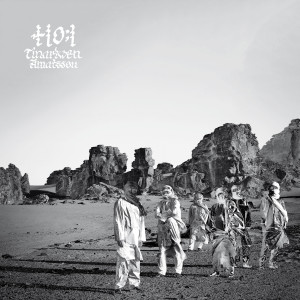 I’ve been a fan of the music of Tinariwen since their 2004 sophomore release Amassakoul, and although I’ve not followed their every release I’ve always remained aware of them. I’ve reviewed several albums by some of the other bands that make the Tuareg “desert blues” style of music invented by Tinariwen including Terakaft, Tamikrest, and Imarhan, and one of my favorite releases of the 2010s was the live compilation from what turned out to be the final Festival au Desert (which was developed and hosted by Tinariwen and made them many fans among the global musical elite including Robert Plant). And I’m a fan of (but haven’t reviewed) the more experimental Touareg band Mdou Moctar.
I’ve been a fan of the music of Tinariwen since their 2004 sophomore release Amassakoul, and although I’ve not followed their every release I’ve always remained aware of them. I’ve reviewed several albums by some of the other bands that make the Tuareg “desert blues” style of music invented by Tinariwen including Terakaft, Tamikrest, and Imarhan, and one of my favorite releases of the 2010s was the live compilation from what turned out to be the final Festival au Desert (which was developed and hosted by Tinariwen and made them many fans among the global musical elite including Robert Plant). And I’m a fan of (but haven’t reviewed) the more experimental Touareg band Mdou Moctar.
So I was delighted to have the opportunity to review Tinariwen’s latest Amatssou, their ninth studio album. It’s a continuation of the loping desert blues style they pioneered, and also a continuation of this group’s commitment to exploration, growth, and collaboration. This time out they draw on some major players in Americana. Grammy winning producer and guitarist Daniel Lanois (I’ve covered his albums Belladonna and Goodbye to Language) was originally signed on to produce Tinariwen’s ninth at his Nashville studio but had to bow out due to Covid, so Amatssou instead was recorded mostly in Algeria and Morocco, but Lanois was able to contribute pedal steel and piano to three tracks.
Even more significantly, Nashville sideman extraordinaire Fats Kaplin contributed pedal steel, fiddle, and banjo across four of the 10 main tracks, and upcoming Nashville bluegrass banjo picker Wes Corbett on one, the opening number “Kek Alghalm.” This is a great opening track with lead tenor vocals and lead guitar by longtime member Abdallah Ag Alhousseyni. After a brief rubato intro it leaps out of the speakers, a fast-loping song that’s more desert bluegrass than desert blues – not solely due to Corbett’s banjo but also the driving percussion.
The second track and first single, “Tenere Den” hearkens all the way back to the early desert blues of Ali Farka Touré, whose collaboration with Ry Cooder was my introduction to hypnotic Malian guitar music. It’s also a throwback to the basic call-and-response song style, with founding member Alhassane Ag Touhami on lead vocals (and lead guitar) with other band members echoing back the verses, as you can see in this lyric video. What’s not a throwback is Kaplin’s jazzy, Celtic-influenced fiddle performance on this one.
Original founding member Ibrahim Ag Alhabib next steps up with his guttural lead vocal, plus lead guitar, on “Arajghiyine.” It’s a mesmerizing performance all around, with his stuttery guitar lines way out front at times, playing in a trademark tone that I find thrilling. Lanois provides some steel guitar fills throughout.
“Jayche Atarak” sounds like what the whole project might have been had Lanois produced. He adds lots of that atmospheric pedal steel sound (think of Dylan’s Time Out of Mind and Emmylou Harris’s Wrecking Ball) to this plodding desert noir. He provided “additional production” to this and a couple of other tracks, and it’s most apparent on this one, with effects added to some of the many layers of percussion and Ag Alhabib’s smoky vocals on the lyrics about civil strife and the cost of war with lines like “Whatever happens / The martyrs will be avenged / like it or not.”
There’s plenty of variety on this album, within the basic framework of Tuareg blues, which they call ishumar or assouf (“nostalgia” in their native language, Tamashek). The combination of Kaplin’s banjo licks and Lanois’ pedal steel washes gives “Anemouhagh” a recognizable folk rock ambience. On “Imidiwan Mahitinam” they stray from their usual loping four-four rhythm to a complex, polyrhythmic six-beat rhythm. The strident percussion and forceful, stinging guitars give this one a metal feel, appropriate for its lyrics that encourage their Touareg listeners to fight oppression with one mind. And I’m picking up more of Ali Farka Touré’s influence in the spiky, stuttering guitar that starkly contrast with Ibrahim Ag Alhabib’s understated vocals.
Earlier incarnations of Tinariwen featured women singing lead and backing vocals, and a couple of inserted tracks here nod in that direction. “Interlude” features a solo on the traditional one-stringed fiddle known as the imzad, which is played exclusively by women; and a final “Outro” is a solo female vocal with no accompaniment. With Amatssou Tinariwen continue to develop their sound in subtle ways while remaining true to their core sound and ethos.
(Wedge, 2023)
Website | Instagram | Facebook | Twitter
